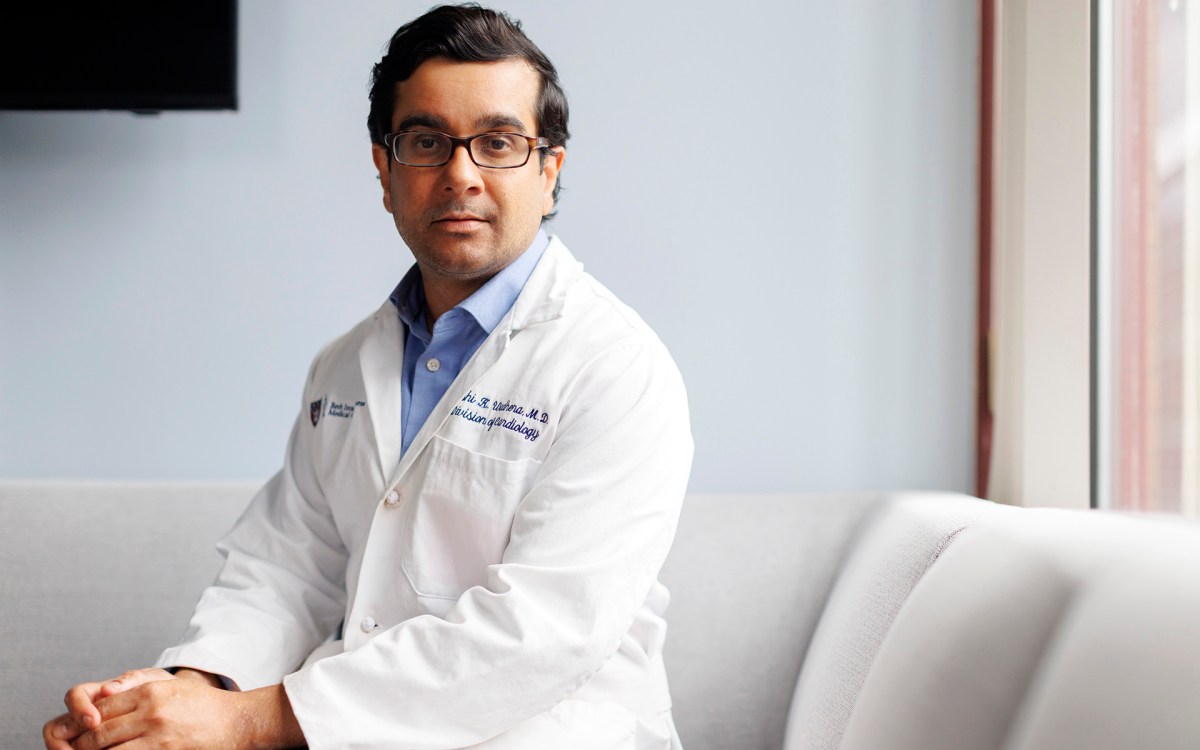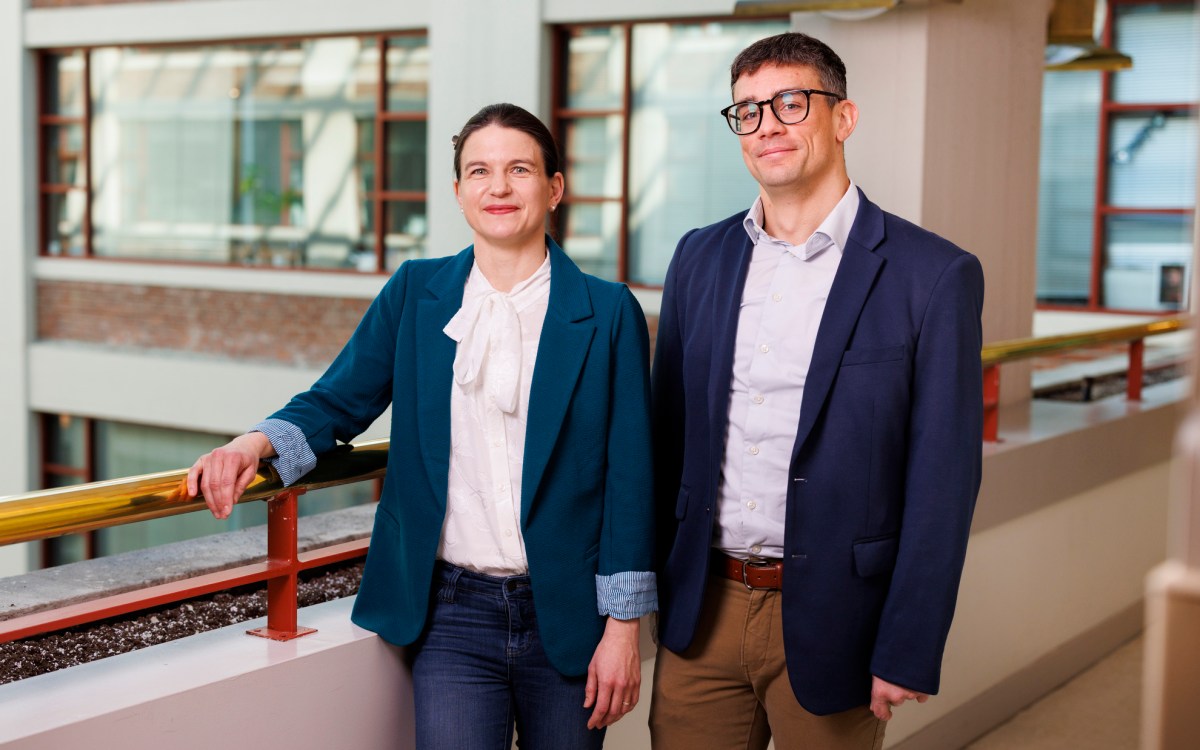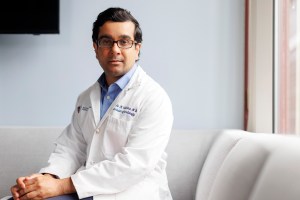Health
-

American heart health worsening
New statistical snapshot finds disappointing trend despite advances in treatment, ways to prevent nation’s leading cause of death

-

Tracking mysteries of loss of Y chromosome, cancer
Research suggests it may explain higher incidence, severity of some disease in men
-

How realistic is ‘The Pitt’?
Doctors weigh in on what hit TV show gets right and wrong about life in the ER — from pacing and caseloads to workplace culture (and that waiting room from hell)
-

Yoga can help cut severe, initial opioid-withdrawal period in half, study finds
Researchers say results could dramatically increase chances of recovery
-

6 keys to a long, healthy life (ice cream included)
Also, why reading Ben Franklin beats climbing Mount Everest
-

Six cancers rising faster in younger adults than older ones
Large new global study fuels growing concern over trend of increases in several types

-
Faking happiness for fun and profit
Laura Morgan Roberts of Harvard Business School and Stéphane Côté of the Rotman School of Management at the University of Toronto, Canada, studied 103 working college students. “We found that…
-
Animal study demonstrates carbon monoxide may help heart patients
Restenosis — reclogging of the heart’s arteries — is a vexing problem for patients who have undergone balloon angioplasty for the treatment of coronary heart disease. The condition apparently develops…
-
Combination therapy shows promise for delaying progression of Lou Gehrig’s disease
In a study, researchers reported that the combination of minocycline and creatine resulted in additive neuroprotection in the case of amyotrophic lateral sclerosis, also known as Lou Gehrig’s Disease. After…
-
Wide variation in physician career satisfaction seen across local markets
Physician career satisfaction levels are relatively consistent from year to year, and a clear majority of physicians nationally are satisfied with their careers. However, a survey showed significant variation in…
-
Medical texts and other fictions
In the 19th century, hysteria was considered one of the most common disorders afflicting women. Doctors advised parents to keep their daughters from riding horseback, eating vanilla, or reading novels,…
-
Study identifies risk factors for retained objects after surgery
A study found that errors involving leaving surgical sponges or instruments inside patients are more likely to happen during emergency procedures, or in operations where there is a sudden change…
-
Scientists identify hundreds of worm genes that regulate fat storage
Findings by Harvard researchers, published in the Jan. 16, 2003 issue of Nature, represent the first survey of an entire genome for all genes that regulate fat storage. The research…
-
Kidney disease genes tied to flow sensing
Polycystic kidney disease, or PKD, is the most common life-threatening genetic disease. It is caused by mutations in one of two genes. Though the genetic defect that causes PKD is…
-
Enzyme pair joins fight against drug-resistant bacteria
Scientists have been striving to develop antibiotics against drug-resistant bacterial strains. Most attempts have been plagued by a lack of molecular tools for manipulating — and ultimately improving — the…
-
Testosterone drives away the blues
In the 1940s, experiments showed that major depression can be relieved by injecting testosterone into men with low levels of that hormone. The treatment never caught on because the shots…
-
Hundreds of thousands with multidrug-resistant tuberculosis could be saved
A study has provided the first hard evidence that outpatient community care in poor, urban shantytowns can work for the most difficult to treat form of tuberculosis. The multidrug-resistant tuberculosis…
-
Study finds frequent consumption of alcohol linked to lower risk of heart attack in men
Men who drank moderate amounts of alcoholic beverages three or more times a week had a risk of myocardial infarction 30 to 35 percent lower than nondrinkers. The observational study,…
-
Meat consumption may not increase breast cancer risk
After following 88,647 women for 18 years, the largest and longest individual study of its kind to date, researcher Michelle Holmes and her co-investigators found no evidence that intake of…
-
Alzheimer’s disease: New theory on how it damages brain
Studies have shown that the buildup in the brain of certain toxic proteins, called amyloids, leads to the emergence of the symptoms of Alzheimer’s disease. Research has traditionally focused on…
-
It may someday be possible to stay slim while eating what you want
A study led by Joslin Diabetes Center researchers and published in the Jan. 24, 2003 issue of the journal Science brings scientists one step closer to turning the dream of…
-
Men can reduce stroke risk by eating fish
Researchers tracked the diet and health outcomes of more than 43,000 male participants for 12 years. Using detailed food frequency questionnaires, participants were asked how often they ate fish, ranging…
-
Many Americans hold incorrect beliefs about smallpox and smallpox vaccine
If physicians are reluctant to be vaccinated themselves against smallpox, large numbers of Americans will be unwilling to do it voluntarily. Also, if there are deaths from side effects of…
-
Hospital length of stay may not affect a newborn’s health
Researcher Jeanne M. Madden and colleagues used seven-and-a-half years of data on 20,366 mother-infant pairs with normal vaginal deliveries within a large Massachusetts health maintenance organization to determine the effects…
-
Formin gene may explain a common cause of female infertility
Harvard Medical School researchers Philip Leder and Benjamin Leader have discovered that oocytes from female mice without the formin gene Fmn2 cannot correctly position the metaphase I DNA-spindle. This produces…
-
Replacing joints early may be better than waiting for some osteoarthritis sufferers
In a study, scientists from Brigham and Women’s Hospital (BWH) and Toronto Western Hospital followed the progress of patients who opted to have joint replacement surgery. They found that those…
-
Hormone replacement therapy may lower degenerative eye disease risk in postmenopausal women
ARM is a degenerative eye disease that affects the macula, which is responsible for central vision, which is necessary for reading, driving and recognizing people’s faces. Advanced ARM is the…
-
Chlamydia pneumoniae may contribute to heart attacks, strokes
Murat Kalayoglu of the Massachusetts Eye and Ear Infirmary, Peter Libby of Harvard-affiliated Brigham and Women’s Hospital, and Gerald Byrne of the University of Tennessee Health Science Center searched MEDLINE…
-
Risk of stroke from obesity is now measurable
While it has been suspected for some time that being overweight could potentially increase a person’s chances of a stroke, a study published in the Dec. 9, 2002, issue of…
-
Gene signature identifies leukemia patients who should avoid transplants
It was previously known that only slightly over half of the patients with adult T-cell acute lymphoblastic leukemia (ALL) could be cured with chemotherapy. Adult ALL patients often undergo transplants…
-
Physicians say they have personally experienced medical errors
A nationwide survey examined the views of 831 physicians in April-July 2002 and 1,207 adults in April-June 2002. Some 42 percent of the public and more than one-third of U.S.…
-
Study of phthalate exposure in humans finds association with sperm DNA damage
Phthalates are a class of compounds used to hold color and scent in many cosmetics and personal care items such as soaps, detergents, skin preparations and aftershave lotions, and they…
-
New drug combination may prevent dangerous complication of bone marrow transplantation
An ongoing clinical study by Dana-Farber Cancer Institute scientists suggests that a three-drug therapy, which includes a novel medication called sirolimus, reduces graft-versus-host disease (GVHD) in stem cell transplant patients…
-
Scientists discover gene “signature” for tumor’s tendency to spread
Most cancer deaths are caused not by the original or primary tumor but by the metastasizing of tumor cells to other organs. Until now, cancer specialists have viewed the development…
-
Study predicts risk of prostate cancer death
Researchers followed 381 people to “identify predictors of time to prostate specific death following external radiation therapy.” “The results of this study give us a better understanding of what form…
-
Bottle-feeding before bed time may increase risk of childhood asthma
Nearly one in 13 children in America has asthma. The National Institutes of Health reports that the prevalence of asthma around the world has doubled in the last 15 years,…


